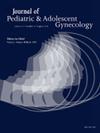Social Support Related to Menses in Gender-Diverse Adolescents: A Qualitative Study
IF 1.8
4区 医学
Q3 OBSTETRICS & GYNECOLOGY
引用次数: 0
Abstract
Study Objective
Menses in transgender or gender-diverse people can cause dysphoria, which has been linked to various comorbid conditions including depression, anxiety, and suicidal ideation. Although social support is thought to be beneficial for adolescents in general, little is known about its effects on gender-diverse adolescents (GDAs) receiving care. Thus, this study sought to document the effects of social support on the menses management experiences for GDAs and highlight how such support influences their access to and satisfaction with gender-affirming care.
Methods
Participants were recruited from a tertiary care children’s hospital to participate in semi-structured phone interviews. Eligibility included adolescents who were 12-20 years of age and had undergone menarche. Interviewers asked respondents about the impact of menses on their mental health, relationships, daily activities, and experiences with menses management and suppression.
Results
A total of 36 individuals participated, with a mean age of 16.82 (SD 2.02) years. Six major themes were identified related to social support: Types of Support, Support Persons within the Social Network, School Environment, Medical Providers as a Social Support, Resources, and Advice for Others.
Conclusion
This study highlights the vital role of social support as GDAs navigate gender-affirming care and menses management. The exploration of various sources of support—such as family, peers, and health care providers—emphasizes the importance of safe, affirming environments for GDAs. Clinicians as perceived support have a unique opportunity to foster shared decision-making and health advocacy by using preferred pronouns, recognizing dysphoria triggers, and considering GDAs’ perspectives when developing care plans.
性别差异青少年经期相关社会支持的质性研究
研究目的:跨性别或性别多样化人群的月经可导致烦躁不安,这与各种合并症有关,包括抑郁、焦虑和自杀念头。虽然一般认为社会支持对青少年有益,但对其对接受照顾的性别多样化青少年(GDAs)的影响知之甚少。因此,本研究试图记录社会支持对gda月经管理经验的影响,并强调这种支持如何影响她们获得性别肯定护理的机会和满意度。方法:从一家三级保健儿童医院招募参与者参加半结构化电话访谈。资格包括12-20岁并经历过月经初潮的青少年。采访者询问受访者月经对其心理健康、人际关系、日常活动以及经期管理和抑制经历的影响。结果:共36人参与,平均年龄16.82岁(SD 2.02)。确定了与社会支持有关的六个主要主题:支持类型、社会网络中的支持人员、学校环境、作为社会支持的医疗提供者、资源和对他人的建议。结论:本研究强调了社会支持在性别确认护理和月经管理中的重要作用。对各种支持来源(如家庭、同伴和医疗保健提供者)的探索强调了安全、肯定的gda环境的重要性。临床医生作为公认的支持有一个独特的机会,通过使用首选代词,识别焦虑的诱因,并在制定护理计划时考虑gda的观点,促进共同决策和健康宣传。
本文章由计算机程序翻译,如有差异,请以英文原文为准。
求助全文
约1分钟内获得全文
求助全文
来源期刊
CiteScore
3.90
自引率
11.10%
发文量
251
审稿时长
57 days
期刊介绍:
Journal of Pediatric and Adolescent Gynecology includes all aspects of clinical and basic science research in pediatric and adolescent gynecology. The Journal draws on expertise from a variety of disciplines including pediatrics, obstetrics and gynecology, reproduction and gynecology, reproductive and pediatric endocrinology, genetics, and molecular biology.
The Journal of Pediatric and Adolescent Gynecology features original studies, review articles, book and literature reviews, letters to the editor, and communications in brief. It is an essential resource for the libraries of OB/GYN specialists, as well as pediatricians and primary care physicians.

 求助内容:
求助内容: 应助结果提醒方式:
应助结果提醒方式:


